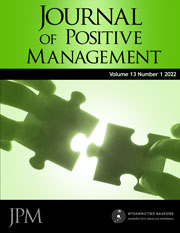The Relations Between Dynamic Capabilities and Core Competencies. The Case Study of Uzdrowisko Ciechocinek S.A.
DOI:
https://doi.org/10.12775/JPM.2022.006Abstract
Purpose: This article addresses the relationship between dynamic capabilities and core competencies of companies. Both categories are among the most popular and practical issues in management science, fitting into the resource-based view of the firm. They should be consciously worked out in the company and both have the potential to become sources of sustainable competitive advantages. Despite a good study of the two issues in the literature, little attention has been paid to their relationship. The author has attempted to do so believing that it will contribute to further empirical research.
Method: A case study of a leading Polish sanatorium company, the Uzdrowisko Ciechocinek S.A., which is in the process of permanent and purposeful organizational changes, was used. The starting point for the empirical study is the theoretical model representing the relationship between dynamic capabilities, core competencies, core products/services, and end products/services of company.
Results: The results obtained illustrate the positive relationship between the variables used in the study. It was found that dynamic capabilities positively influence changes of core competencies, and thus contribute to the development of core products/services and end products/services. These relationships support the creating and strengthening of sustainable competitive advantages of the studied enterprise despite the constant, intensive and often negative changes in the conditions of its business environment.
Keywords: dynamic capabilities, core competencies, strategic management, case study
Paper type: Research paper
Downloads
Published
How to Cite
Issue
Section
License
Copyright (c) 2023 Paweł Cegliński

This work is licensed under a Creative Commons Attribution-NoDerivatives 4.0 International License.
Copyright
Articles submitted to the journal should not have been published before in their current or substantially similar form, or be under consideration for publication with another journal. Authors submitting articles for publication warrant that the work is not an infringement of any existing copyright and will indemnify the publisher against any breach of such warranty. For ease of dissemination and to ensure proper policing of use, papers and contributions become the legal copyright of the publisher unless otherwise agreed.
Plagiarism and ghostwriting
In response to the issue of plagiarism and ghostwriting the editors of the Journal of Positive Management has introduced the following rules to counteract these phenomena:
1. Contributors should be aware of their responsibility for a content of manuscripts.
2. Collective authors are obliged to reveal the contribution and an affiliation of each author (i.e. who is an author of specified part of a paper).
3. Any act of dishonesty will be denounced, the editors will inform appropriate institutions about the situation and give evidence of all cases of misconduct and unethical behaviour.
4. The editors may ask contributors for financial disclosure (i.e. contribution of specified institutions).
Stats
Number of views and downloads: 735
Number of citations: 0



